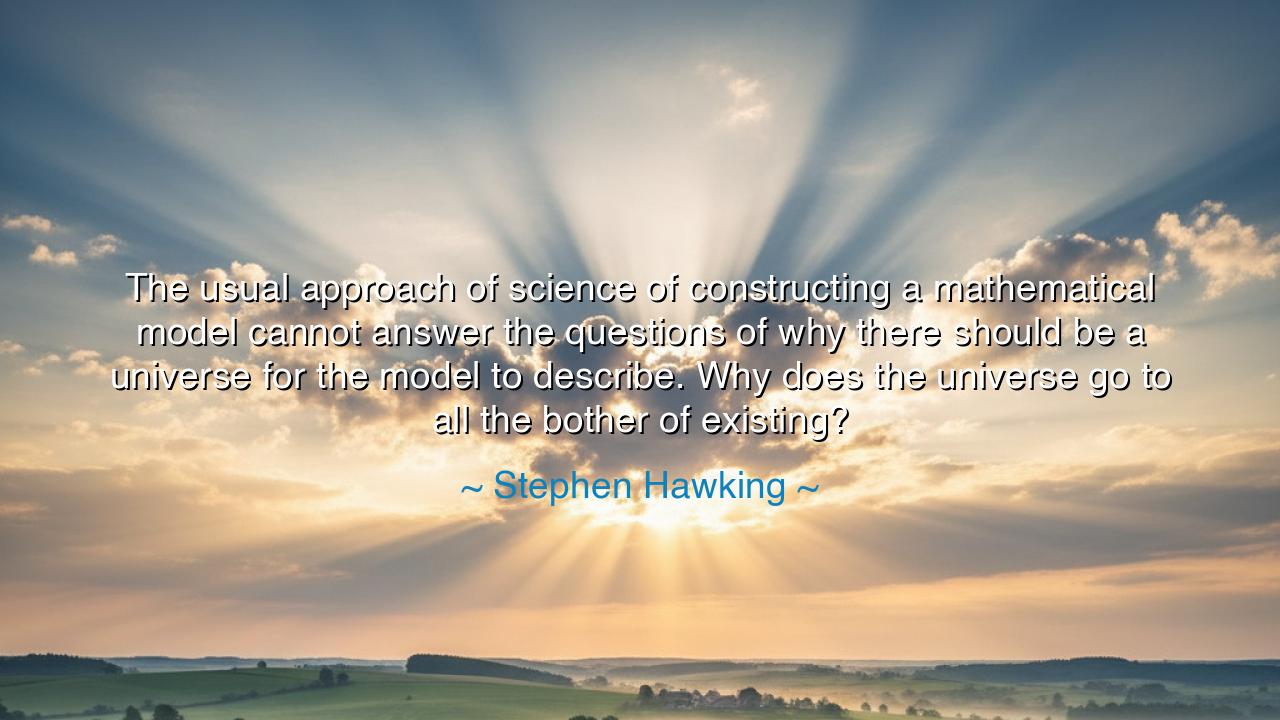
The usual approach of science of constructing a mathematical
The usual approach of science of constructing a mathematical model cannot answer the questions of why there should be a universe for the model to describe. Why does the universe go to all the bother of existing?






Hear, O seekers of truth, the words of Stephen Hawking, who speaks of the profound mysteries that lie beyond the reach of science. He said: "The usual approach of science of constructing a mathematical model cannot answer the questions of why there should be a universe for the model to describe. Why does the universe go to all the bother of existing?" In these words, Hawking poses a question that has been at the heart of philosophy and science for millennia: why does the universe exist at all? What is the purpose, the cause, or the reason behind its very existence? Science, in its pursuit of understanding through mathematical models, may explain how the universe works, but it does not answer the deeper why—the essence of existence itself.
In the ancient world, great thinkers like Plato, Aristotle, and Socrates wrestled with the nature of existence, asking not only what the world was made of, but why it existed. Plato spoke of the Forms, eternal and perfect ideals that gave shape and meaning to the material world. For Plato, the question of existence was tied to the world of the divine, the realm of the perfect that manifested in the imperfect reality we experience. Aristotle, too, sought to understand the nature of the universe through his concept of the unmoved mover, a force that set all things into motion but was itself not moved by anything else. These early philosophers sought to understand not only the structure of the world, but the cause behind its very being.
Hawking’s words echo these ancient questions, but with a modern understanding shaped by the tools of science. In the modern era, science has made tremendous strides in explaining the how—how galaxies form, how life evolves, how forces like gravity and electromagnetism govern the universe. Mathematical models have allowed us to understand the mechanics of the cosmos with stunning precision. But still, Hawking reminds us that there is a deeper question that science cannot answer—a question that transcends equations and theories: why does the universe exist? Why go to the trouble of creating a world that follows laws, when the laws themselves seem to lead nowhere, offering no explanation for existence itself?
Consider the ancient tale of creation—in the Hebrew Bible, Genesis begins with the simple yet profound question of creation: "In the beginning, God created the heavens and the earth." The creation of the universe is presented not as a random event but as the act of a divine will, a force that sought to bring order out of chaos. This ancient story, though born from a particular faith, captures the essential question that Hawking raises: why create the heavens and the earth at all? What is the purpose behind the very existence of the universe? Science, though it may describe the laws of nature, cannot answer this existential question, for it falls beyond the realm of empirical observation and into the domain of philosophy and metaphysics.
The lesson here, O children of the future, is not that science is powerless, but that it is only one tool in the quest for truth. Science excels in describing the how—the workings of nature and the universe. But when it comes to the why, the reason for existence, we must turn to other forms of inquiry—philosophy, theology, and spiritual reflection. The question of why the universe exists, and why we are here to ask, is not one that can be solved by equations alone. It is a question that touches the very soul of humanity, that speaks to our deepest longings for meaning, purpose, and connection to the cosmos.
As you journey through life, remember that there is a place for both science and wonder. Seek to understand the how of the world—the mechanics of the natural laws, the patterns that govern the universe. But never forget to also ask the why—the purpose behind your own existence. Just as Hawking sought to understand the vastness of the cosmos through the lens of science, so too should you seek to understand the meaning of your own life, the reason for your place in the universe. The two quests—science and philosophy—are not enemies; they are two sides of the same coin, each shedding light on a different aspect of the same great mystery.
In your own lives, O children of time, let the search for knowledge be both grounded in reality and soaring with imagination. Ask the questions that science can answer, but also ask those questions that lead to a deeper understanding of your existence. Seek both truth and meaning, for in the balance of the how and the why, you will find a deeper understanding of the universe and your place within it. Embrace both the beauty of the cosmos and the mystery of existence, for in doing so, you will find not only knowledge, but wisdom.






AAdministratorAdministrator
Welcome, honored guests. Please leave a comment, we will respond soon